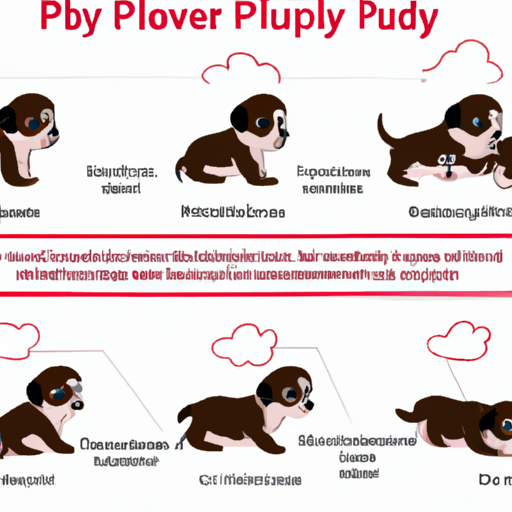As a caregiver, understanding the different stages of puppy development is essential. The journey from a newborn pup to a full-grown dog is an exciting and rewarding one. Here, we’ll walk you through the seven stages of puppy development, so you can better care for your furry friend.
1. Neonatal Period (0 – 2 Weeks)
Newborn puppies are entirely dependent on their mother. They’re born deaf, blind, and toothless. Their main activities are feeding and sleeping.
During this stage:
- Puppies rely on their sense of touch and smell.
- Their mother regulates body temperature.
2. Transitional Period (2 – 4 Weeks)
This stage is marked by rapid physical and sensory development.
- Puppies’ eyes open around the 2nd week.
- They start to hear and respond to taste and smell.
- Baby teeth begin to appear.
- They start to walk in a wobbly manner.
3. Socialization Period (4 – 12 Weeks)
This is a critical stage for puppies to socialize with humans and other dogs.
- Puppies become more independent and start to explore their surroundings.
- They learn to interact with their siblings, other dogs, and humans.
- This is the right time to start simple obedience training.
4. Juvenile Period (3 – 6 Months)
In this stage, puppies are like “teenagers.”
- They have an abundance of energy and curiosity.
- Their adult teeth start to grow.
- They may challenge authority, so consistent, positive reinforcement training is crucial.
5. Adolescence (6 – 18 Months)
Adolescence in dogs is similar to humans.
- Puppies may become sexually mature.
- They continue to learn about social hierarchy among dogs.
- They may become more independent and may not listen to commands.
6. Young Adulthood (18 – 24 Months)
During this stage, dogs are typically at their most energetic.
- They need lots of physical and mental stimulation.
- They may challenge their caregiver, testing boundaries.
- They may need additional training to correct unwanted behaviors.
7. Maturity (2+ Years)
The dog has now reached full maturity.
- They’re likely set in their ways.
- They may still need physical activity, but not as much as younger dogs.
- Regular vet check-ups are recommended to keep them healthy.
Frequently Asked Questions
What are the signs that my puppy is developing normally?
If your puppy is active, playful, eating well, and growing consistently, they’re likely developing normally. Any drastic behavior or physical changes should be checked by a vet.
How can I best support my puppy during these stages?
Provide a balanced diet, regular vet check-ups, socialization opportunities, and consistent training.
When should I start training my puppy?
Basic obedience training can start during the socialization period (around 4 weeks). More intensive training can start in the juvenility stage (around 3 months).
What if my puppy is developing slower than the typical timeline?
Each puppy is unique. If you’re concerned about your puppy’s development, consult with a vet.
What if my puppy is aggressive with other dogs or people?
If your puppy is showing signs of aggression, it’s important to consult with a professional dog trainer or a vet. They may be reacting out of fear or because of a lack of socialization.
Remember, every dog develops at its own pace. The stages outlined above are guidelines to help you understand what to expect during your puppy’s growth. Your role as a caregiver is to provide love, care, and patience through each of these stages. After all, the journey is just as important as the destination.



